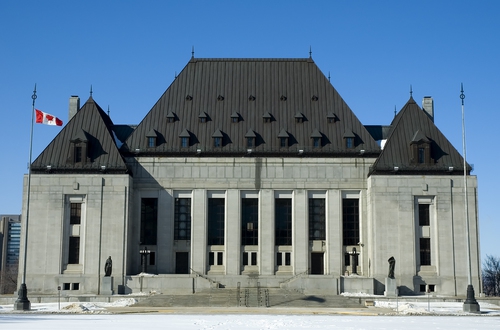
Supreme Court declares ban on physician-assisted death unconstitutional
By Bruce Cheadle The Canadian Press
Features Profession Regulations Supreme Court of Canada
Supreme Court of Canada In a historic decision, the Supreme Court of Canada has unanimously struck down the ban on providing a doctor-assisted death to mentally competent but suffering and “irremediable” patients.
The groundbreaking ruling from the country’s top court sweeps away the existing law and gives Parliament a year to draft new legislation that recognizes the right of clearly consenting adults who are enduring intolerable suffering – physical or mental – to seek medical help ending their lives.
The judgment, which is unsigned to reflect the unanimous institutional weight of the court, says the current ban infringes on all three of the life, liberty and security of person provisions in Section 7 of the Charter of Rights and Freedoms.
It does not limit physician-assisted death to those suffering a terminal illness.
The court clearly instructs parliamentarians that current laws “unjustifiably infringe s. 7 of the charter and are of no force or effect to the extent that they prohibit physician-assisted death for a competent adult person who (1) clearly consents to the termination of life and (2) has a grievous and irremediable medical condition (including an illness, disease or disability) that causes enduring suffering that is intolerable to the individual in the circumstances of his or her condition.”
The pressure will now be on Parliament to act in an election year, as the court says no exemptions may be granted for those seeking to end their lives during the 12-month suspension of the judgment.
The families of two now-deceased British Columbia women, supported by the B.C. Civil Liberties Association, spurred Friday’s decision.
Gloria Taylor, who had a neurodegenerative disease, eventually died of an infection. Kay Carter, then 89, travelled to Switzerland, where assisted suicide is allowed.
Taylor had won a constitutional exemption at a lower court for a medically assisted death in 2012, but that decision was overturned in subsequent appeals.
The Supreme Court gave a ringing endorsement of the original B.C. trial judge’s findings, albeit not for a constitutional exemption.
The decision reverses the top court’s 1993 ruling in the case of Sue Rodriguez, a fact the decision attributes to changing jurisprudence and an altered social landscape.
Two decades ago, the court was concerned that vulnerable persons could not be properly protected under physician-assisted suicide, even though courts recognized the existing law infringed a person’s rights.
But the experience of existing jurisdictions that permit doctor-assisted suicide compelled the courts to examine the record.
The B.C. trial judge “found no compelling evidence that a permissive regime in Canada would result in a ‘practical slippery slope,’” wrote the top court.
“An individual’s response to a grievous and irremediable medical condition is a matter critical to their dignity and autonomy,” the judgment says.
“The law allows people in this situation to request palliative sedation, refuse artificial nutrition and hydration, or request the removal of life-sustaining medical equipment, but denies the right to request a physician’s assistance in dying.”
The ruling goes on to state that “by leaving people like Ms. Taylor to endure intolerable suffering, it impinges on their security of person.”
The nine Supreme Court justices also note that when their court struck down the country’s prostitution laws in 2013, it recognized that the legal conception of “gross disproportionality” has changed since the Rodriguez decision.
“By contrast, the law on overbreadth, now explicitly recognized as a principle of fundamental justice, asks whether the law interferes with some conduct that has no connection to the law’s objectives,” says the judgment.
“The blanket prohibition (on physician-assisted death) sweeps conduct into its ambit that is unrelated to the law’s objective.”
The court agreed with the trial judge “that a permissive regime with properly designed and administered safeguards was capable of protecting vulnerable people from abuse and error. While there are risks, to be sure, a carefully designed and managed system is capable of adequately addressing them.”
Print this page